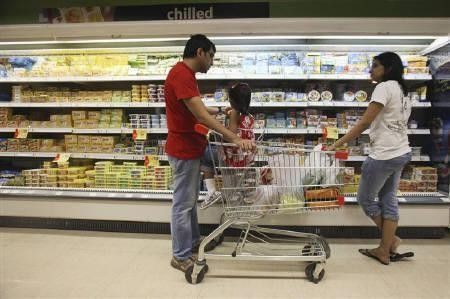Foreign Investment in Retail: India Backtracking on Reform?

The government gave its first signs of backtracking over a move to allow foreign supermarket giants to enter Asia's third-largest economy on Monday as political opposition grew over one of the most far-reaching economic reforms in years.
Powerful chief ministers of several government-allied states and some legislators within the ruling Congress party are pressing the government to reverse its move. Parliament was adjourned for a fifth day amid uproar from legislators.
The government said in a statement that foreign retailers would have to source 30 percent of their goods from small Indian industries, after previously saying that these purchases could come from any small industries globally.
The Press Trust of India reported that Sonia Gandhi discussed how to end a parliamentary logjam over the government's boldest reform in years that threatens the fate of some key bills.
The DMK and Trinamool Congress parties, two of the government's biggest parliamentary allies that give Congress a majority in parliament, oppose the move that would allow store chains like Wal-Mart up to a 51 percent stake in retail ventures.
The government may call a meeting of the main political parties on Tuesday to discuss how to end the parliamentary standoff.
The uproar could force a vote on one of the government's biggest reforms in years. If it loses that vote, in theory it could spark a wider vote of no-confidence in the Congress party-led ruling coalition.
The government coalition has a parliamentary majority of roughly 18 seats. But several of its biggest allies say they oppose the retail reform, and parliament was adjourned on Monday amid scenes of uproar in the lower house.
The opposition Bharatiya Janata Party said it will push for a vote known as an adjournment motion over the new retail regulations.
The reform briefly breathed new life into the government of Prime Minister Manmohan Singh, who ushered in free market reforms 20 years ago but has been bogged down by corruption scandals and has increasingly been seen as a lame duck.
But it was a politically risky move, coming ahead of major state elections next year that could redraw the political map ahead of 2014 general elections. The opposition claims the retail move will mean millions of small shopkeepers lose their jobs.
As well as appealing to a burgeoning urban middle class, supporters say the reform will draw in much-needed new investment to a sputtering economy. Policymakers say spending on cold-storage and warehousing will also ease supply-side pressures that have driven inflation close to a double-digit clip.
© Copyright Thomson Reuters 2024. All rights reserved.





















